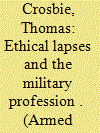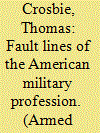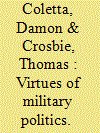| Srl | Item |
| 1 |
ID:
161546


|
|
|
|
|
| Summary/Abstract |
In a recent issue of this journal, we published an article titled “Fault Lines of the American Military Profession”. Donald S. Travis subsequently wrote a Dipustatio Sine Fine rejoinder that raised a number of criticisms of our piece and suggested several ways forward. For our part, we detect three serious problems in Travis’s analysis and offer a single syncretic response. Our solution builds on the insights of Travis’s critique while avoiding the pitfalls of his specific line of reasoning. We conclude by urging others to continue to debate and research these very consequential and timely issues.
|
|
|
|
|
|
|
|
|
|
|
|
|
|
|
|
| 2 |
ID:
160628


|
|
|
|
|
| Summary/Abstract |
Over the past decade, the American armed services have witnessed a near-constant stream of so-called ethical lapses. Spanning rank, specialty, and service, these “lapses” have given rise to a flood of criticism by journalists and piercing calls for reform from politicians. In response, American military leaders have pointed to the paired concepts of profession and professionalism as the solution. In this article, we use classical conceptualizations of the military profession to resituate the problem of ethical lapses as instead one of the three fault lines of the contemporary American military profession, unfolding alongside crises in military expertise and identity. The three fault lines reveal at once the large scale of the challenges facing the American armed services and our very limited social scientific understanding of those problems. We end by emphasizing the need for future research to establish an updated empirical baseline for theories of the military profession in America.
|
|
|
|
|
|
|
|
|
|
|
|
|
|
|
|
| 3 |
ID:
177001


|
|
|
|
|
| Summary/Abstract |
Sociologists and political scientists have long fretted over the dangers that a politicized military poses to democracy. In recent times, however, civil–military relations experts in the United States accepted retired or indeed still serving generals and admirals in high-ranking political posts. Despite customary revulsion from scholars, the sudden waivers are an indicator that military participation in momentous national security decisions is inherently political without necessarily being partisan, including when civilian authority defers to a largely autonomous sphere for objective military expertise. Military politics is actually critical for healthy civil–military collaboration, when done prudently and moderately. Janowitz and Huntington, founders of the modern study of civil–military relations, understood the U.S. military’s inevitable invitation to political influence. Here, we elaborate on two neglected dimensions, implicit in their projects, of military politics under objective civilian control based on classical virtues of civic republicanism: Aristotle’s practical wisdom and Machiavelli’s virtú.
|
|
|
|
|
|
|
|
|
|
|
|
|
|
|
|